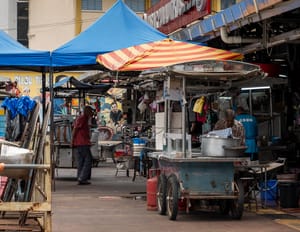PULAU TIKUS MARKET, located along Jalan Pasar between Jalan Cantonment and Solok Moulmein, first opened in the 1950s. The wet market is a vibrant, bustling place where families from different backgrounds gather each morning to sell fruits, vegetables, fish and poultry. It forms the core around which dry stalls sell items such as traditional medicine, kitchen and laundry items, bread, snacks and clothing.
- Home
- Photo Essay
- Families Hard at Work at Pulau Tikus Market

Previous Post
Joachim Bergström: On Using Universal Values to Drive Diplomacy
12 min read
As his tenure comes to an end, Penang Monthly sits down with Joachim Bergström to talk about his team’s efforts in introducing these universal values to the country, and how these can strengthen the bilateral relationship between Sweden and Malaysia.
Next Post
Beyond Borders: A Personal Perspective on Brain Drain
3 min read
GROWING UP IN Penang, my early exposure to Hollywood movies and TV sitcoms painted an idealistic portrait of first-world living—…
You might also like
A Couple's Passionate Journey On The Ikat Trail
9 min read
This collection of ikat textiles spans the Nusantara region, with different tribal cultures and histories, from the lush rainforests of Sarawak to the stunning, exotic islands east of Bali in Indonesia.
Postcards and Photos of Penang's Hills
3 min read
*Images from Marcus Langdon Collection.
TWO YEARS AFTER setting foot on Penang Island in 1786, Francis Light set his sights…
Malay Houses in Penang: Circa 1900
3 min read
*Images from Marcus Langdon Collection.
MALAYS IN PENANG traditionally lived inland or along the coast, depending on their livelihoods. This…






